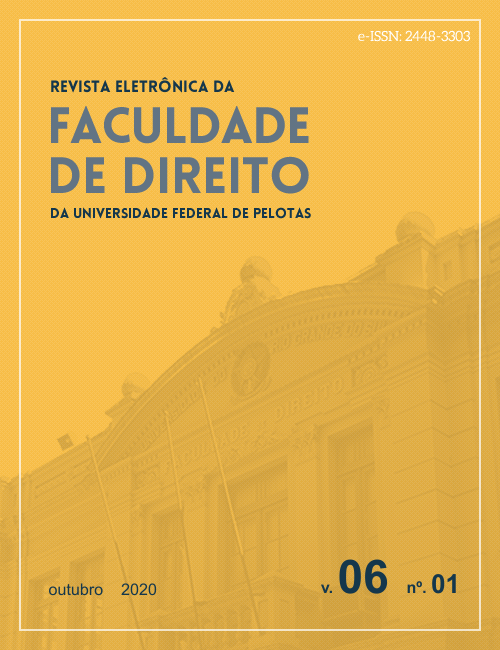As famílias na ciência jurídica do século XXI: aspectos sob o enfoque do direito civil-constitucional
Resumo
Resumo: O presente texto busca analisar alguns aspectos das relações familiares sob o enfoque da nova percepção civil-constitucional. Anteriormente formatada de modo institucionalizado e regida por normas inderrogáveis de ordem pública, sedimentadas nas grandes codificações civis, a família sofria de um alto teor de incursão regulatória estatal; era apenas aquela decorrente de uma relação unívoca entre homem e mulher, onde o casamento legitimava a prole, e a consanguinidade era vista como perspectiva máxima para a formatação dos laços de parentesco. Após o influxo valorativo das declarações internacionais de direitos pós segunda guerra mundial, posteriormente incorporado nas constituições republicanas, a dignidade da pessoa humana alcança a condição de elemento unificador do sistema, e a percepção de novos direitos com aspectos transindividuais fazem com que a família passe a ser percebida não como sedimentada à chancela estatal, mas muito mais como realidade existencial, advinda do exercício da autonomia privada como autodeterminação existencial, sendo necessário adotar-se uma interpretação de reenvio das normas constitucionais que em sua dimensão operativa, por remeterem o intérprete para a complexidade e riqueza de elementos sociais. A construção da dimensão normativa da conceituação de família mediante uma nova percepção das relações socioafetivas, faz com que o rol previsto no artigo 226 da Constituição Federal, sob esse influxo, merece uma interpretação não tipificante, mas meramente exemplificativa, na medida em que a família atualmente não mais se resume nem se exaure nas tipologias previamente estabelecidas pela Constituição da República. Para além do casamento, da união estável, e das entidades familiares formadas por quaisquer dos pais e seus descendentes, passa-se hodiernamente a ser possível um conceito de família hoje de forma muito mais alargada, recepcionando-se inúmeras formas de convivência pautadas pela afetividade duradoura a moldar novas formas de se fazer família. Daí que sob o influxo valorativo da Constituição da República de 1988 a família é hoje uma realidade materializada pela plena autodeterminação existencial, onde persistem e vicejam inúmeras formas diferentes de convivência duradoura, capazes de embasar faticamente a formação de novas formas de organização familiar, estruturadas no afeto, e incorporadas a um conceito constitucional e mais amplo acerca das dimensões de cooperatividade e solidariedade.
Palavras-chave: Direito Civil Constitucional; Famílias; Auto-Determinação Existencial; Novas Subjetividades; Interpretação de Reenvio; Socioafetividade; Cooperatividade e Solidariedade.
Abstract: This text seeks to analyze some aspects of family relationships from the perspective of the new civil-constitutional perception. Previously formatted in an institutionalized way and governed by non-derogable public order rules, based on large civil codes, the family suffered from a high level of state regulatory incursion; it was just that resulting from a univocal relationship between man and woman, where marriage legitimized the offspring, and consanguinity was seen as the maximum perspective for the formation of kinship ties. After the valuation influx of international declarations of rights after the Second World War, later incorporated into the republican constitutions, the dignity of the human person reaches the condition of unifying element of the system, and the perception of new rights with transindividual aspects makes the family become be perceived not as sedimented by the state seal, but much more as an existential reality, arising from the exercise of private autonomy as existential self-determination, being necessary to adopt an interpretation of referral of constitutional norms that in its operative dimension, by referring the interpreter to the complexity and richness of social elements. The construction of the normative dimension of the conceptualization of family through a new perception of socio-affective relationships, makes the role provided for in article 226 of the Federal Constitution, under this influence, deserves a non-typifying interpretation, but merely exemplary, as the family currently it is no longer summarized or exhausted in the typologies previously established by the Constitution of the Republic. In addition to the marriage, the stable union, and the family entities formed by any of the parents and their descendants, today a concept of family is now much more widely possible, receiving innumerable forms of coexistence guided by affection. to shape new ways of making a family. Hence, under the evaluative influence of the 1988 Constitution, the family is today a reality materialized by full existential self-determination, where countless different forms of lasting coexistence persist and flourish, capable of basing the formation of new forms of family organization, structured in the affection, and incorporated into a broader constitutional concept about the dimensions of cooperativity and solidarity.
Keywords: Constitutional Civil Law; Families. Existential Self-Determination; New Subjectivities; Interpretation of Referral; Socio-Affectivity; Cooperativeness and Solidarity.
Sumário: Introdução. 1. A institucionalização da família pelo mundo ocidental: a petrificação das relações de cooperatividade e solidariedade familiar. 2. O desenrolar de uma nova perspectiva: o influxo constitucional e os novos valores nas relações familiares. 3. As relações familiares no século XXI: a autodeterminação existencial dos indivíduos a embasar uma nova realidade. Considerações finais. Referências.

 1
1

